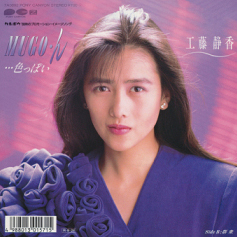Hitomi Furuya, known professionally as Hitomi, is a Japanese singer-songwriter. She began her career as teen model before making her singing debuting under the helm of Tetsuya Komuro in 1994, who produced Hitomi's earliest work in pop music. Hitomi has striven for artistry over the course of her career, penning "forward-looking" lyrics and becoming known for her "unusual" fashion sense that accompanied a "supermodel allure". Her signature songs include "Candy Girl", "Love 2000" and "Samurai Drive".

Maki Goto is a Japanese singer, lyricist, and former actress. Born and raised in Edogawa, Tokyo, Goto began her musical career in 1999 when she joined Morning Musume as the only third generation member. Her first single with the group, "Love Machine", topped the Oricon singles charts and sold over a million copies. Goto was the lead vocalist of the group up until her graduation from the group in 2002. While still a member of Morning Musume, Goto released her debut solo single, "Ai no Bakayarō", in 2001, which topped the Oricon charts. In 2003 she released her debut album, Makking Gold 1, which debuted at number four on the Oricon album charts.

Ami Suzuki is a Japanese recording artist, DJ, and actress from Zama, Kanagawa, Japan. Having been discovered at the talent TV show Asayan, she was one of the most popular female teen idols in the late 1990s. However, in 2000, Suzuki faced legal problems with her management company resulting in a controversial blacklisting from the entertainment industry. Suzuki attempted to resurrect her career under her own steam with two indie singles before signing to Avex Trax in 2005. She released "Delightful", a dance song that reached No. 3 on the Japanese Oricon charts with a style similar to electronic club music, significantly different from her pop idol days. Since her appearance in the 2006 film Rainbow Song, Suzuki has gradually made a name for herself in the acting field, starring in various movies, television series, and musicals.

Hitomi Shimatani is a Japanese pop singer.

"Whatever" is a song recorded by Japanese recording artist Ayumi Hamasaki for her second studio album, Loveppears (1999). It was written by Hamasaki, while production was handled by Max Matsuura. The track is Hamasaki's sixth single with Matsuura since her debut single in April 1998, "Poker Face". "Whatever" premiered on February 10, 1999 as the lead single from the album. It was re-released on February 28, 2001 as a CD single.
The discography of Japanese pop singer Koda Kumi includes 17 studio albums, 2 cover albums, 10 compilation albums, 10 remix albums, 9 live albums and 57 singles. All of her Japanese musical releases have been with Rhythm Zone, a sub-label of Avex Group.

Perfect Crime is the second studio album by Japanese recording artist Mai Kuraki. It was released on July 4, 2001, by Giza Studio.

Fairy Tale is the third studio album by Japanese recording artist Mai Kuraki. It was released on October 23, 2002 under Giza Studio label.

Checkmate! is a collaboration album by Japanese popsinger Namie Amuro, featuring a collection of her collaborations with other musicians released between 2003 and 2011, as well as four new collaborations. The album was released on April 27, 2011, about one month after its original release date, due to 2011 Tōhoku earthquake and tsunami.

"Deepness" is a song recorded by Japanese singer Misia. It was co-written by Misia and Jun Sasaki and produced by Misia. "Deepness" was released as a single by Ariola Japan on November 7, 2012. It is the theme song to the TBS drama series Ōoku: Tanjō - Arikoto / Iemitsu-hen, starring Masato Sakai and Mikako Tabe.

Colours is the fifteenth studio album by Japanese recording artist Ayumi Hamasaki. It was released on July 2, 2014, in Japan by Avex Trax, worldwide by Avex Entertainment Inc., and on July 18 in Taiwan by Avex Taiwan. The songs on the album were entirely written by Hamasaki, while production was led by long-time collaborator Max Matsuura; it also included a variety of Western producers such as Armin van Buuren, members from RedOne Productions De Paris and Rush, Darkchild, and Fedde Le Grand, among others. This became Hamasaki's first studio album to have not been fully produced by Matsuura, and her first album to incorporate a large amount of English language. Musically, Colours is an electronic dance music album.

Universe is the eighth studio album by Japanese recording artist Kumi Koda. It was released as a double album with her third greatest its album Best: Third Universe on February 3, 2010, by Rhythm Zone. Beginning in early 2009 after completing two mini-concert tours, the album's production was handled by several music producers, such as Andy Dodd, Adam Watts, Figge, Tim Larsson, Tommy Henriksen, U-Key Zone, Thomas Gustafsson, and H-Wonder. It also features a guest appearance from Koda's sister and Japanese recording artist Misono. Koda contributed towards the album as the executive producer and songwriter. Universe is primarily a J-pop album with numerous elements of dance-pop, rock, R&B, electropop, and pop ballads.

Winter of Love is Japanese singer Kumi Koda's seventh compilation album, released under Rhythm Zone. It was issued in CD, CD+DVD/Blu-ray and CD+Fan Club DVD editions. The album features some of Kumi's top selling ballads, as well as two new songs. The track On And On was used as primary promotional song. The music video for On And On was the first music video strictly made for mobile phones. Kumi premiered the music video during a live broadcast on her official LINE account on 19 January 2016. It was released worldwide the following day. The full video kept the cellphone aesthetic, but was rendered to fit full screen.

Smile is the eleventh studio album by Japanese singer and songwriter Mai Kuraki. The album was released on February 15, 2017, by Northern Music. It is the follow-up to her 2014 compilation album, Mai Kuraki Best 151A: Love & Hope. The album was released on three editions: standard edition, fan club edition, and limited edition, which is accompanied with a bonus disc. Smile

Finally is the seventh compilation album by Japanese singer Namie Amuro. It was released on November 8, 2017, by Dimension Point in three physical formats, alongside limited edition goods. Additionally, Finally is also Amuro's final musical release before she retired from the music industry on September 16, 2018.

Self Portrait is the second greatest hits album by Japanese singer and songwriter Hitomi. It was released through Avex Trax on September 4, 2002, coinciding with the video album Hitomi Live Tour 2002 Huma-Rhythm. The two-disc compilation spanned Hitomi's eight-year career at that point; viewing it as the beginning of a fresh start, she devised a release "atypical" of the traditional greatest hits format.

"Mugon... Iroppoi" is a song recorded by Japanese singer Shizuka Kudo. It was released as a single by Pony Canyon on August 24, 1988. It was used in the Kanebo Cosmetics televised ad campaign of fall 1988, for which the catchphrase was "n... Iroppoi". Kudo made her first appearance on the 39th Kōhaku Uta Gassen and performed "Mugon... Iroppoi" for the Red team. The song was nominated for the Grand Prix at the 30th Japan Record Awards.

"Clear" is a song recorded by Japanese singer Maaya Sakamoto. It was released as a single on January 31, 2018, through FlyingDog. It was written by Sakamoto and composed by Yoshiki Mizuno of the band Ikimono-gakari. "Clear" is the opening theme to the NHK anime Cardcaptor Sakura: Clear Card, the sequel to Cardcaptor Sakura, for which Sakamoto's "Platinum" served as opening theme for the third season close to twenty years prior. An acoustic take of "Platinum" performed on June 4, 2017 at the Itsukushima Shrine in Hiroshima is included as a coupling track on the single.

"Sakura" (サクラ) is a song recorded by Japanese singer-songwriter Ayaka. It was officially released nationwide as a digital single through A Station on February 12, 2018. A limited physical release was initially made available through Ayaka's official fan club Room Ayaka and at concert venues for her Acoustic Live Tour 2017-2018 3-Star Raw concert tour on October 14, 2017.

Re(Cord) (stylized as re(CORD)) is the sixteenth studio album by Japanese singer-songwriter Koda Kumi. It was released on November 13, 2019, which coincided with Kumi's 37th birthday. It was released in four editions: CD only, CD+DVD, CD+Blu-ray and a CD+3DVD fan club edition.


















